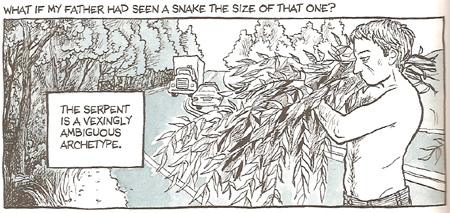
Fun Home‘s subtitle is “A Family Tragicomic”, and it couldn’t be more apt. Alison Bechdel‘s blunt, hyper-literate voice is a singular one in the world of graphic novels, and makes for an autobiography more self-exploratory than most others. Bechdel approaches her past misfortunes with a wry, sardonic tone that only lapses a few times- and is all the better for it.
The novel ostensibly revolves around Bechdel’s father and her upbringing in his meticulously arranged house. The ideally paced story flits back and forth between her early days, his early days, and her first year in college, always referencing back to Papa Bechdel in some way. Even her own coming out is aligned with his life spent in the closet; the two run parallel to each other throughout the entire book. Every subplot is upon a spoke that radiates from the history of the stern but internally conflicted Bruce Bechdel. It’s like putting together a jigsaw puzzle as most people do- jumping from one corner to the other until slowly the gaps are bridged and the large chunks begin to converge.

Bechdel recounts her days growing up in an 1880 Victorian funeral home with a sly sense of self-awareness. Ever the precocious child, her relationship with her father is less a familial bond than it is an intellectual rivalry. Though the pair rarely show each other blatant affection, their respective secrets create a mutual bond of respect. It’s very clear that they complement each other better than anyone else in the Bechdel family, and it’s this understated connection that makes for a fascinating insight into her father’s legacy and lasting impact on her life.

It’s a dense read. It might not be particularly long, but it will take far more than one run-through to full grasp every thread Bechdel presents. There are allusions aplenty, from Greek myths to F. Scott Fitzgerald and Proust references. She analyzes her father psychologically a few times. Her various childhood stories are shown in an episodic manner and gleaning the purpose behind each one (and they ALL have a purpose) is not for the faint of heart. This ain’t no comic book, this is literature with a capital L.
It’s all compounded by the fact that Bechdel loves her words, both in terms of quality and quantity. If there’s one qualm readers may have with this book it’s that sometimes there are just too many five-dollar words on the page. This is especially true during flashbacks to her parents’ courtship, where excerpts from books and letters are shown. It’s a lot to digest.

Some may also find her analysis a little too clinical at times, but her dry demeanor is essentially a part of who she is and she acknowledges that in the book. Besides, this just makes the few moments of sincerity hit that much harder. There are several well-placed lapses in her cool character (such as when her coming out is upstaged by her mother’s revelation about her father’s secret life) that would not feel as important if she’d been less sardonic throughout the novel.

As graphic novels continue to grow in popularity, more and more will be inevitably turned into movies. This is one that begs to be adapted- it’s got Academy Award winner written all over it. Let’s call up Charlie Kaufman.
Final Grade: A